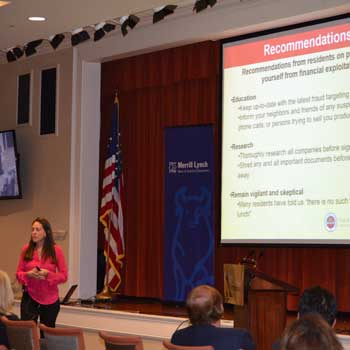
On Oct. 27, researchers from the College of Criminology and Criminal Justice presented findings and recommendations from their study on elder financial exploitation to residents of Westminster Oaks, a retirement community located in Tallahassee, Fla. Their hope was that the presentation would arm residents with knowledge regarding elder financial fraud and ultimately reduce the prevalence of such fraud in their community.
The discussion was part of the College’s continuing focus on the causes, methods, and prevention of elder fraud and financial exploitation. The presentation was sponsored by the Osher Lifelong Learning Institute and also involved Merrill Lynch, which partnered with the College on research, and AARP, which provided information about community and national resources available for victims of elder fraud.
The College’s researchers provided residents with a detailed background of the study. In 2011, it was reported that $2.9 billion was exploited from elderly victims – a 12 percent increase from 2008. The fastest growing segment of the U.S. population is 65 and older, so the occurrence and impact of elder financial fraud will likely continue to escalate.
Despite these alarming trends, there was little research on the facts, prevention, and policies related to elder financial fraud. This lack of information led the College, in partnership with Merrill Lynch and Seniors vs. Crime, to begin a study on elder financial fraud in The Villages, one of the largest retirement communities in the nation.
“We needed to have better firsthand knowledge of how extensive the problem of elder financial fraud is in order to develop needed policies and practices that can effectively reduce this growing problem,” said Principle Investigator Thomas Blomberg.
Blomberg, along with Julie Mestre Brancale and George Pesta, addressed four questions through their research: One, what are the most common types of financial fraud perpetrated against the elderly? Two, what role do salient life events, such as retirement, death of a spouse, and declining health have on the risk of elder financial fraud? Three, what are protective factors against elder financial exploitation? Four, what are the consequences of elder fraud victimization?
Combing through diverse data—including reported incident data, arrest statistics, national surveys, focus groups, and interviews—researchers found that in The Villages between Jan. 2010 and May 2015, there were 3,735 complaints of elder fraud victimization, but only 265 arrests, resulting in an average loss of $2,000 to perpetrators. They also found the most common source of fraud was in home services, particularly unnecessary repairs.
The researchers also examined other types of fraud The Villages residents were exposed to, including misleading sales and advertisements, investment fraud, embezzlement, sweepstakes scams, fraud by health professionals, identity theft, and forgery crimes. They discussed the methods used to exploit elderly victims and what made them particularly vulnerable to each type of fraud.
They then discussed the impact of salient life events, or “turning points,” such as death or incapacitation of a spouse, a significant health diagnosis, moving, and changing social support networks. The researchers found that each of these events, alone and in combination, can increase an elderly individual’s likelihood of financial exploitation.
As a result of victimization, residents of The Villages suffered psychological and emotional distress, impact on their quality of life and health, and devastating consequences for their financial security. Researchers also discovered that retirement communities provided a false sense of security to residents, raising the likelihood of exploitation among residents. Further, they determined that elder fraud is significantly underreported because victims are embarrassed and are unaware how to report victimization.
Blomberg, Mestre Brancale, and Pesta also gave recommendations to residents to help reduce vulnerability when it comes to elder fraud. They noted that protective factors, such as education, skepticism, and strong support networks, helped to reduce incidents of fraud. The researchers also found that community service centers, which would provide comprehensive services at a single location for seniors, help reduce elderly victimization. Other effective services for seniors include hotlines, lists of “endorsed” services, classroom education, media outreach, “shopping buddy” programs, support groups, and referral services. Accordingly, community service centers that provide such services can act as a surrogate family or trusted friend, educating seniors to avoid exploitation and guiding them through the recovery process. The research team anticipates the recommendations, if applied and fostered, will reduce the prevalence of financial fraud.
“This is just another example of how the College is working to bring research to life,” said Blomberg. “Here, the College’s research provides real insight into problems confronting some of Florida’s most vulnerable citizens, the elderly, as well as recommendations for the prevention of elder financial exploitation.”
Download the full report and executive summary of “Elder Financial Exploitation in a Large Retirement Community” from the Related Links box.

